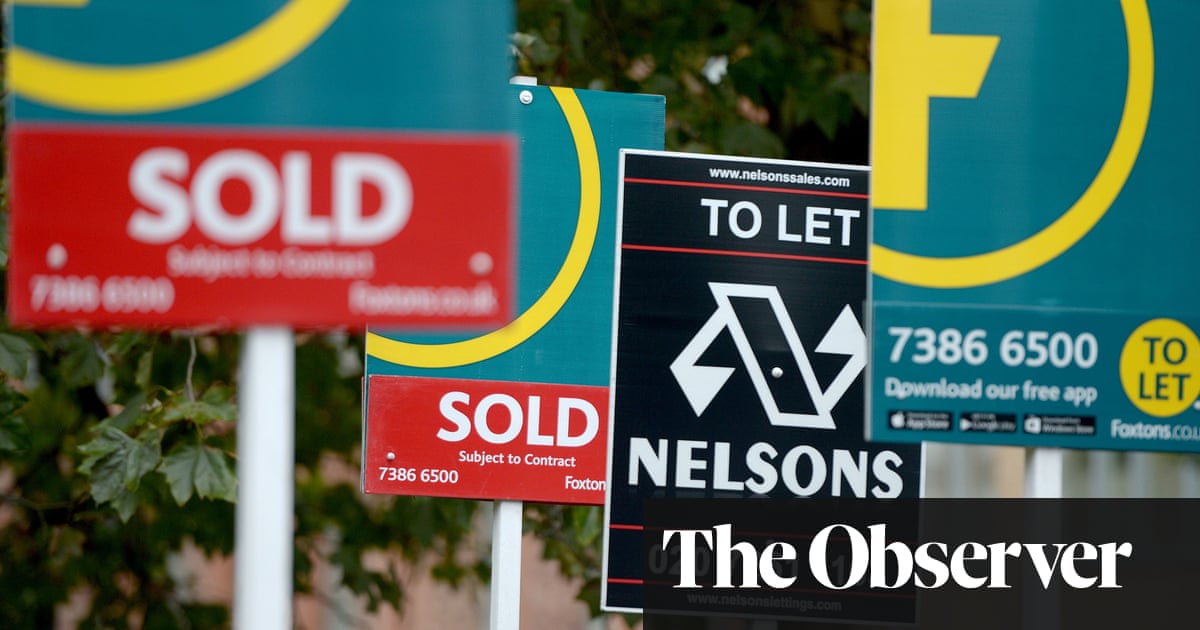Rishi Sunak has been accused of “locking the door on home ownership” and entrenching inequality, amid evidence that tens of thousands more young house buyers have been forced to turn to the “bank of mum and dad” to secure a new home.
A crisis in housing affordability is again set to be a major election flashpoint, with the prime minister already admitting in recent months that the Conservatives needed to do more to address falling home ownership rates among the young. The party has failed in its manifesto pledge to build 300,000 houses a year.
However, Sunak is now being attacked with figures suggesting there has been a notable rise in the share of young house buyers turning to friends and family for help in securing their property. The proportion of first-time buyers receiving such a gift to help with their deposits hit 37% in 2022-23, up from 27% a year earlier. It represents a 40% increase and some 89,000 extra households.
It follows new figures released just days ago revealing that the number of planning approvals for new house-building sites reached a record low in 2023. Permissions for new homes in England fell 20% last year, while the number of sites approved was the lowest since the Home Builders Federation began its survey in 2006.
It has led to warnings that home ownership is declining among the young and creating further inequalities, with wealthier young people more likely to be handed financial help for their first home from their families. There are also demands for action to improve the condition, security and price of privately rented homes that millennials have increasingly been pushed towards.
The findings come after Sunak and his chancellor, Jeremy Hunt, abandoned plans to introduce a 99% mortgage scheme in the budget, which would have greatly reduced the deposit needed for those taking it up. Banks and housing experts had warned that while it would have helped boost home ownership in the short term, it risked locking out even greater numbers in the future.
Acute concerns remain at the top of the Tory party over the issue. Michael Gove, the levelling up secretary who has been pushing for firmer action, has warned that young people will lose faith in democracy if they are locked out of affordable housing. While half of baby boomers owned their own home at the age of 30, this has fallen to less than a third among millennials.
Angela Rayner, Labour’s deputy leader who highlighted the increasing role of the “bank and mum and dad” in the English Housing Survey, said Sunak had put party management and the short term over the needs of the country. Compulsory local house-building targets were scrapped after a Tory revolt.
“Parents should not be forced to shell out their life’s savings or sell the family silver to get their grown-up children on the housing ladder,” she said. “Young people lucky enough to have parents able to support them are raiding the bank of mum and dad, while those without that opportunity have seen the dream of home ownership shattered. The Tories have crashed the economy and caused a housing crisis which is locking people who work hard and play by the rules out of owning their own home.”
She said that Labour would reform planning laws as part of the party’s commitment to building 1.5m new homes in the next parliament should it win the election, including the “next generation of new towns”. She said first-time buyers would also get “first dibs” on new houses in their area.
Housing experts warned that while the English Housing Survey data could be volatile, affordability continued to be a huge barrier. Neal Hudson, a housing analyst at BuiltPlace, said many of those wanting to buy their own home -– especially in London and the south-east – had needed help from friends or family for a decade or more.
“We need a long-term strategy about reducing prices relative to incomes, while not compromising that future with short-term election gimmicks. That means looking at planning and government funding for affordable, social rented homes. It also potentially includes looking at things like property taxation such as council tax and stamp duty.”
Molly Broome, an economist from the Resolution Foundation think tank, said that savings built up by wealthier parents during the Covid pandemic could be behind the increase in gifts. “There’s definitely the risk that this is going to exacerbate existing inequalities,” she said. “People that are already on a higher income, who would probably become homeowners eventually, may be able to do that sooner because they are more likely to receive a financial gift and a larger gift than those who have lower income and family wealth.”
A Department for Levelling Up, Housing and Communities spokesperson said: “We are committed to creating a fair housing system that works for everyone, including increasing first-time buyer numbers in all regions and boosting availability of new, genuinely affordable housing.
“Over 876,000 households have been helped to purchase a home since spring 2010 through government-backed schemes. Our long-term plan for housing will go even further to build the homes that local communities want and need, backed by £10bn to boost supply and £11.5bn for affordable homes.”







